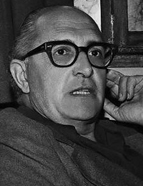

Jorge de Sena led a life marked by professional experiences which accounted for an eclectic intellectual production grounded on the search for knowledge in its multiple facets. The social and humanist dimensions of his writings are central to a reflection on his relationship with history and historiography. Although he never renounced his ideological independence, Sena was highly driven by social and political concerns with a Marxist slant. As a poet, he belonged to a generation that established itself in the literary scene of the 1950s and which was heavily marked by humanist values and by the idea of the writer as an entity committed to social causes. Proof of this lies in the essay “Marx and Capital”, where he pays tribute to Marxism while highlighting the need to regard knowledge as a contributory factor to the transformation of society rather than simply as a theory (Maquiavel e Outros...[Machiavel and Others…]). One of his main concerns was searching for ways to bridge the gap between thought and action, knowing and doing, thinking and feeling, culture and technique. (Lourenço, O Essencial Sobre... [The Essential on …], p.32). In fact, it is in the dialectic distinction between knowing and doing that Marxist influences can be detected in the reasoning of this man who did not envisage conflict of any sort between artistic creation and being in the world.
Some parts of Jorge de Sena’s biography attest to his attachment to freedom at both individual and collective levels. He was the son of Augusto de Sena, a captain in the Merchant Navy, and of Maria da Luz Telles Grilo de Sena, born in Lisbon to a bourgeois family of aristocratic lineage. Having attended the Liceu Camões, at the age of 17 he joined the Escola Naval[the Naval Academy] to pursue a career in the Navy to honour his father’s wishes. However, the Spanish Civil War and his inadaptation to military discipline were determinant for his decision to leave the Navy (Idem, p. 18). In 1938, he entered the Faculdade de Engenharia do Porto [the Oporto University School of Engineering] where he completed a degree in civil engineering six years later. Although he was not affiliated to a political party, Sena, from an early age, had been involved in activism against Salazar’s regime. When he publicly voiced his political views on the antidemocratic workings of the Estado Novo [New State], Sena became a target of censorship and of other forms of pressure that culminated in his exile. In October 1945, a group of democrats, including himself, gathered at the Centro Escolar Republicano Almirante Reis [Almirante Reis Republican School Centre] to demand that the government postpone the general elections, dismantle the PIDE [the Portuguese Secret Police] and abolish censorship. This led to the creation of the Movimento de Unidade Democrática [Democratic Unity Movement] (MUD), which existed legally until 1948.
